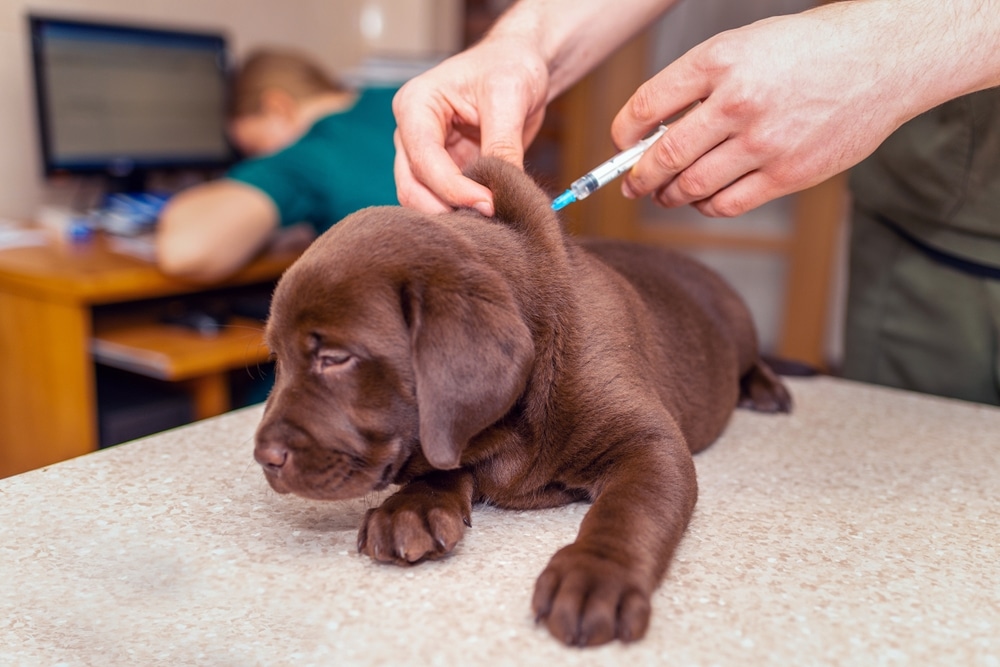Puppies are adorable furballs who bring us great joy, laughter, and companionship. However, puppies also come with responsibilities, such as vaccination needs. Vaccinations are crucial to protect puppies from various diseases that could be life-threatening. While vaccines are not the most exciting puppy care topic, they are necessary for keeping your pup safe and healthy. Read our Pets & Friends Animal Hospital team’s guide to the vaccines your puppy needs during their first year.
What vaccines does my puppy need?
Our team will examine your puppy during their first exam and begin their first round of shots when your pup is around 6 to 8 weeks of age. Newborn puppies whose mothers were vaccinated retain some antibodies that typically leave the pup’s system after a few months.
Core canine vaccines are strongly recommended and sometimes required by law because they protect against common, contagious canine diseases. Core vaccines for puppies include:
- Canine distemper virus (CDV) — This highly contagious and often fatal virus affects a puppy’s respiratory, gastrointestinal (GI), and nervous systems. Vaccination against distemper is usually started at around 6 to 8 weeks of age and given every three to four weeks until a puppy is about 16 weeks old.
- Canine parvovirus (CPV) – Parvovirus is another highly contagious and potentially deadly disease, particularly affecting the GI tract. Vaccinations for parvovirus start at around 6 to 8 weeks of age, with booster shots given every three to four weeks until the puppy is approximately 16 weeks old.
- Canine adenovirus (CAV-2 or infectious canine hepatitis) — This virus affects the liver and other organs, and vaccination helps protect against hepatitis and respiratory disease caused by adenovirus. The vaccination schedule usually aligns with that of distemper and parvovirus, starting at 6 to 8 weeks of age and given every three to four weeks until the puppy is around 16 weeks old.
- Rabies — Rabies is an often fatal viral disease affecting mammals’ nervous system, including that of humans. Laws regarding rabies vaccination vary by location, but this vaccine is typically administered to puppies between 12 and 16 weeks of age, with boosters required at intervals dictated by local regulations.

Your puppy’s geographic location, activities in which they participate, and access to boarding, grooming, and daycare facilities all determine their additional—noncore—vaccine needs. For example, many boarding or grooming businesses require your puppy to be vaccinated against Bordetella or kennel cough, a highly contagious upper respiratory illness. Common noncore canine vaccines include:
- Canine parainfluenza — Parainfluenza is a component of the kennel cough complex. Vaccination may be recommended for puppies in environments where they are likely exposed to other dogs such as in boarding facilities or dog parks.
- Bordetella bronchiseptica — Another component of kennel cough, this bacterium can cause respiratory infections in dogs. Vaccination may be recommended for puppies in similar environments as those in which parainfluenza can also easily spread.
- Leptospirosis — This life-threatening bacterial disease can affect dogs and humans and is typically spread through contact with contaminated water or soil. Vaccination may be recommended for puppies at risk of exposure, such as those living in rural areas or spending time outdoors where the disease is prevalent.
- Lyme disease — Lyme disease is a common tick-borne disease that can cause lameness, lethargy, joint stiffness, inappetence, swollen lymph nodes, and fever. Lyme disease is transmitted through a bite from a deer tick, so areas rife with deer also see a high number of Lyme disease cases. Keep in mind that traveling with your pet to a heavily infected area also puts them at risk for Lyme disease.
Most puppies need boosters every two to four weeks until they are 15 weeks of age, which may seem like many trips to the veterinary clinic, but remember that your pet is only protected from certain diseases through vaccination. During these visits, your pet will also receive a complete physical, heartworm testing, deworming, and many other wellness screenings to promote their optimal health and well-being.
Is it time to have your puppy pal vaccinated? Schedule an appointment with our Pets & Friends Animal Hospital team, so we can tailor your pup’s vaccine schedule based on their lifestyle and individual needs.

